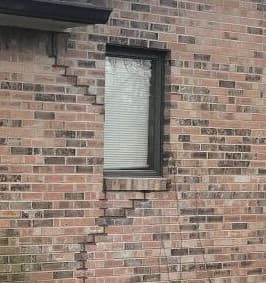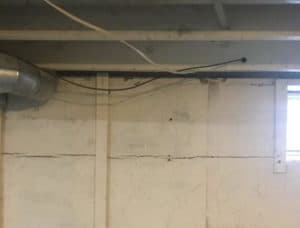
Originally posted 5/4/18, revised by 10/8/20
The housing market can be a complicated place. When you’re selling your home, you’re also (usually) buying a new one. Timing can be a critical issue- you don’t want to pay two mortgages, but you don’t want to be temporarily homeless if you sell your home before your new residence is available, either!
Repair issues can make this worse. You need to make sure your home is in good shape and will pass inspections; unexpected results can delay closing or even cost you a sale. But you don’t want to invest too much in a home you’re leaving.
The best thing you can do is get an honest and detailed assessment. Acculevel has been repairing foundations since Andy Beery started the company in 1996. We frequently work with realtors, homeowners, and potential buyers. We’ve helped thousands of people resolve their foundation problems (and successfully sell their homes) and we want to do the same for you.
In this article, we’re going to review some common signs that you may need to make repairs on your existing home- and what to watch for when you’re shopping for your next one. We’ll also provide you with additional resources to help you make the best decisions for you and your family.
Every home can and does settle. A certain amount of settling is natural and normal- when you build a house, you’re adding a great deal of weight to the ground below it. This soil will shift and compress as the seasons change. You may see slight hairline cracks develop in your foundation. These should be filled and repaired, but at that point they are minor concerns.
But if those cracks are left alone, and the home continues to settle, you’ll see additional signs of trouble. These are usually doors or windows that ‘stick,’ either refusing to open or not staying closed. You may also see cracks in the drywall or plaster around the door and window frames. At that point, you should contact an experienced foundation repair company. We explore settling more in this article.
 This photo was taken by an Acculevel project manager during a free estimate appointment. These stair-step cracks are a sign the foundation is settling.
This photo was taken by an Acculevel project manager during a free estimate appointment. These stair-step cracks are a sign the foundation is settling.
When you’re dealing with a home that has open space below the main floor, there are some additional areas to watch.
Most flooring issues occur in homes with crawl spaces. This is because there is less space between the wooden flooring structure and the ground. Additionally, the ground is usually soil with no flooring on top of it. This allows moisture to accumulate in the space and collect on the beams, joists, and other flooring components. (More on that in the next section.)
Moisture can eventually damage wood, even if it’s treated lumber. Worse, damp wood is a tasty snack for termites- these little invaders can significantly weaken your flooring over time. For more information about sagging floor causes, please refer to this article.
Water intrusion can happen to basements and crawl spaces, however. This is usually caused by hydrostatic pressure, or water saturating the ground and pushing against the foundation. Your foundation is most likely made of concrete; this is a strong material, but it’s porous. Water can make its way through the walls, often creating cracks as it goes. Once this happens, you need to invest in waterproofing.
Waterproofing consists of a drainage channel that is installed along the inside perimeter of the foundation. Water collects in the drainage, which transfers it to a sump pump. The sump pump expels the water out of the basement or crawl space, to a safe distance from the house. If you have a crawl space, you should also add a vapor barrier or encapsulation. This will help prevent moisture from moving from the ground into the crawl space.
Like insects, mold also thrives on damp surfaces. Mold contributes to the decay of wood or concrete, but it does more harm to the people in the house than it does the structure of the home. Healthy people often suffer allergy symptoms when exposed to mold, but it can be especially harmful to infants, children, and anyone with asthma or other respiratory ailments. We have a blog that details what symptoms to look for, as well as what the current research says, about the effects of mold on human health.
This is a sign you need to get a professional foundation repair company in your home, and quickly. When a wall begins to bow, it’s a sign that the wall is actively weakening. Please do not put off this type of repair; when you delay, the damage gets worse and more expensive. This is one instance where you are definitely better off repairing the problem before putting the house on the market. You’ll be able to confidently say that the wall has been stabilized and secured, and ideally have a transferable warranty to include with the home sale.
 This photo was taken by an Acculevel project manager during a free estimate appointment. This long horizontal crack is a sign that the wall is compromised, and beginning to bow.
This photo was taken by an Acculevel project manager during a free estimate appointment. This long horizontal crack is a sign that the wall is compromised, and beginning to bow.
Any of the items in this article would be “flagged” by a home inspector. Your best option is to perform your own home inspection, make note of potential problems, and find out what needs to be done. We have developed a DIY Foundation Inspection Checklist that you can use, free of charge, to anticipate any concerns from a potential buyer.
If you haven’t screened repair companies in a while, let us offer you a refresher course. In our article about Questions to Ask a Contractor, we include a free downloadable copy that you can use with any service provider.
Please use our free comprehensive guide to foundation repairs. It can be read in its entirety, you can select the chapter relevant to you, or bookmark it as a reference when you meet with contractors.
[hubspot type=cta portal=6569536 id=cf53205e-0913-44bb-a51d-ca51845e90d3]
If you are ready to have a contractor come to your house and evaluate your home, please make sure you verify that the company is reputable, insured, and accredited by the Better Business Bureau.
If you live in Indiana or the surrounding states, contact Acculevel. We are a family-owned and operated company, and we provide free written estimates. One of our experienced project managers will evaluate your bowing wall, then recommend the best course of action for you. Our goal is to help you keep your home strong and healthy for years to come.
[DISPLAY_ULTIMATE_SOCIAL_ICONS]